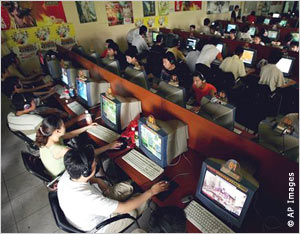From Haiti, we’ve got reports on the cholera outbreak and an effort to restore the island’s devastated libraries. The United State hopes for progress during an upcoming international conference on climate change. Take a look at the U.S. election, from a different angle. Governments need help in fighting corruption. At the APEC forum in Japan, free trade is on the table. See how translating American plays into Russian is a form of cultural diplomacy. And, after years of house arrest, a Burmese pro-democracy activist is released to applause from the United States.
Cholera Mortality Rate Declines in Haiti
As the number of Haitians infected with cholera continues to climb, the overall mortality rate from the disease is decreasing, the State Department’s Assistant Secretary of State for Public Affairs Philip J. Crowley says. Crowley says the shrinking mortality rate results from efforts to control the disease by the Haitian government, the U.S. and other international partners. At right, women cover their mouths and noses at a Haitian hospital.
Rebuilding Haiti’s Libraries
The American Library Association so far has collected $25,000 in donations for Haiti’s libraries from individuals, civic and youth groups, businesses and local libraries.
U.S. Seeks COP16 Progress
The United States expects progress toward a legally binding, global accord on climate change during the international COP16 meeting later this month in Cancún, Mexico. “It is profoundly in our own economic, environmental, and national security interests to act,” says Jeffrey Miotke, climate change coordinator for the U.S. special envoy for climate change.
A Discussion of the Midterms
As Americans headed to the polls November 2, international relations students at the University of Jordan spoke with political scientist Michael Cornfield via a digital video conference to learn more about the American electoral process. High on their list of questions: How would the results of the midterm elections affect the peace process?
Citizens’ Anti-Corruption Role
Civil society — including nonprofit organizations and citizen-activists — must demand accountability from governments for the fight against corruption to be effective, according to the hosts of an international conference meeting in Bangkok.
Talking Free Trade in Asia-Pacific
President Obama and other Asia-Pacific leaders pledge to work toward greater economic integration and creation of an Asia-Pacific free trade area. The 21-economies that make up the Asia Pacific Economic Cooperation (APEC) forum issue a joint statement after their meeting in Japan that praises APEC as “an engine for progress in the world’s most economically dynamic region.”
“The New American Plays for Russia”
Through “The New American Plays for Russia” project, American theater organizations and Russian theater professionals are working together to bring contemporary American drama to Russian audiences.
 U.S. Welcomes Burma’s Release of Suu Kyi
U.S. Welcomes Burma’s Release of Suu Kyi
President Obama and Secretary of State Hillary Rodham Clinton welcome the release of Burmese pro-democracy leader and Nobel laureate Aung San Suu Kyi from house arrest. Obama said Suu Kyi, right, “is a hero of mine and a source of inspiration for all who work to advance basic human rights in Burma and around the world.”


 A Focus on Human Rights in Burma
A Focus on Human Rights in Burma
 Robots Draw Kids to Science
Robots Draw Kids to Science
 (I’m listening to “Rock and Roll” by Led Zeppelin)
(I’m listening to “Rock and Roll” by Led Zeppelin)